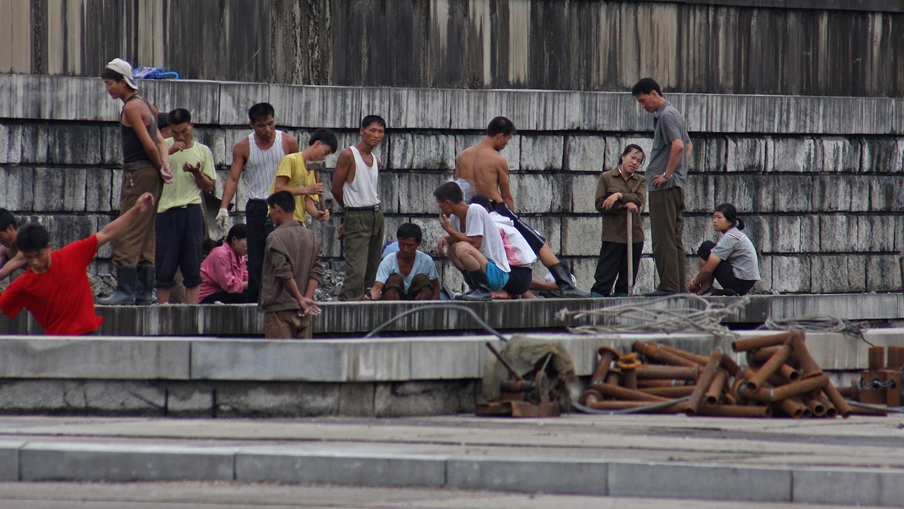North Koreans continue to work in other countries despite a looming deadline for their repatriation home.
United Nations sanctions mandate North Korean laborers to return to their home country by Sunday, Dec. 22. Laborers are a major foreign currency source for the North Korean government. North Koreans continue to work at overseas restaurants, hotels, sea food factories, construction companies and garment factories, Kharon found.
The workers are sent by various North Korean institutions, including Nackwon Guidance and Daesung Bureau of the Office 39, Ministry of Armed Forces, External Construction Bureau and Ministry of Trade and Ministry of Forestry, according to South Korea think tank reports.
North Korean workers face harsh labor conditions with meager salary, according to media and government reports. In Senegal, they work 6 days a week and earn only USD 100 a month after splitting a portion with government authorities back home, one worker told Voice of America in September 2019.
The laborers work on average between 12 hours and 16 hours a day, and sometimes up to 20 hours per day, and are allowed only one or two rest days per month, the State Department said.
Gauging the exact number of North Korean laborers working overseas is difficult, however, due to a lack of available data, which hampers effective implementation of the U.N. sanctions, experts say. In June 2019, the most recent available data released by the U.S. State Department’s Trafficking in Persons report, estimated the number of North Korean laborers to be 90,000.
North Korean and Chinese consular officials met in Beijing in order to strengthen consular cooperation and other matters earlier this month, according to South Korean media reporting.
When asked about the status of North Korean laborers in China last week, a spokeswoman for the Chinese Foreign Ministry said she doesn't have exact figures but "wholeheartedly proclaims that as a responsible member of the global order, China will earnestly execute all relevant U.N. resolutions."
Earlier this week, China and Russia drafted a resolution at the U.N. proposing an end to the ban on North Korean workers overseas, and cancelling of the repatriation deadline.
The Russian ambassador to North Korea said in a September interview with Russian media, that the country would send North Koreans home by the deadline.“To date, the number of DPRK citizens with work visas in Russia has decreased repeatedly. I do not have an exact figure, but it is less than ten thousand. After Dec. 22, not a single one of the North Koreans will remain [in Russia] on these bases. Russia is a responsible member of the international community, it strictly complies with the requirements of the UN Security Council,” the ambassador said.
More than 20 entities involved in restaurants, construction and other industries in Russia were identified by the U.N. Panel of Experts report as Russia-North Korea joint ventures or as being owned by North Korean nationals. Most of the entities are still actively registered in the Russian corporate registry, though the status of their operations is not known.
Four Russia-based construction companies organized under the name Zenko received authorization from Russian Ministry of Labor in 2018 in order to employ 301 North Koreans, according to the March 2019 U.N. Panel of Experts report. One of the companies lists a North Korean owner, according to November 2019 Russian corporate records and the U.N. report.
China is one of the major host countries for North Korean workers, according to 2018 data published by the East-West Center and The National Committee on North Korea.
The country hosts between 20,000 and 80,000 workers, the data show. The Chinese government is reluctant to reveal the number of North Korean workers in the country, however, and it has been opaque about any measures they’ve taken to repatriate North Korean workers. It has not released an interim report on North Korean workers in the country, which was required under U.N. sanctions by March 2019.
Chinese companies are seen as continuing to employ North Korean workers by exploiting loopholes in U.N. sanctions. Chinese food factories and North Korean restaurants insist that North Korean workers are “industrial trainees,” rather than employees; thus, they are not bound to be repatriated to North Korea before the Dec. 22, 2019, U.N. deadline, according to Radio Free Asia.
Thousands of North Korean workers continued to be sent to China, according to October 2019 media reporting, and the number of North Korean workers has increased amid efforts to send more before the December deadline.
China-based Youngor (Hunchun) Co., Ltd. employed more than 3,000 North Korean laborers in a sprawling factory complex, according to an October 2018 report from Chinese think tank Charhar Institute. Youngor Hunchun is one of the subsidiaries of the Youngor Group Co. Ltd, a Chinese conglomerate in the apparel industry. The company has been licensed with a major western clothing brand and continues to market the brand on its website.
In addition, a local media profile on businessman Zhang Xinge, located in China’s border region near North Korea, reported in October 2019 that one of his companies, Hunchun Dongyang Industry Co., Ltd, employs 260 North Korean laborers. Hunchun Dongyang Industry wholly-owns the similarly-named Hunchun Dongyang Seafood Industry & Trade, which reportedly hired North Korean laborers, according to a 2017 Associated Press investigation.
Earlier this decade, Hunchun Dongyang Industry also invested in a North Korea-based joint venture named Korea Rason Kyesong Processing Trade Co. Ltd to export and import seafood, according to a South Korean government report.
Countries in Africa also continued to host North Korean workers. In Senegal, 31 North Korean workers found to be employed by Corman Construction, an alias of the Mansudae Art Studio, which was sanctioned by the U.S. for sending workers to nearly 20 countries.
Corman Construction contracted with Senegal-based Patisen and Arab Emirate-based Semer Holding SA to work on residential buildings and factory construction projects, according to Voice of America.
Analysts from the Asia and Eurasia teams contributed to this report.
